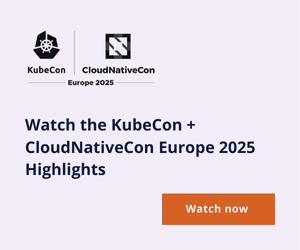-
NVIDIA Unveils DOCA Argus at RSAC 2025 to Boost AI Security
NVIDIA launches DOCA Argus at RSAC 2025, real-time threat detection and runtime protection for AI workloads with isolated DPU-based security.
-
Is Real-time Adaptive Security the Future of Data Integrity and Security
Explore how real-time adaptive security, powered by AI and machine learning, is shaping the future of data integrity and cybersecurity.
-
Introducing the Anaconda Community Channel: Expanding Your Open Source Arsenal While Maintaining Enterprise Control
Introducing the Anaconda Community Channel – Unlock access to over 16,000 additional open-source packages with the new Community Channel in the Anaconda AI Platform. Designed for enterprises, it offers seamless compatibility with Anaconda’s trusted distribution, all while maintaining governance, security, and compliance. Empower developers, reduce admin overhead, and accelerate innovation—without compromising control. Now available for Business tier customers.
-
The Shadow AI Crisis: Why Enterprise Governance Can’t Wait Any Longer
The Shadow AI Crisis: Why Enterprise Governance Can’t Wait – With over 70% of AI use happening outside IT’s control, shadow AI is creating massive security, compliance, and visibility risks. As unofficial tools proliferate, the need for enterprise-ready governance is urgent. Learn how forward-thinking organizations are turning this underground trend into a competitive advantage with smarter platforms, embedded security, and real-time oversight.
-
Zscaler to Transform AI-Driven Security Operations with Red Canary Acquisition
Zscaler expands its AI-driven security operations with the Red Canary acquisition, following Canonic Security and Trustdome.
-
Secure and Scalable Kubernetes for Multi-Cluster Management
Managing multi-cluster Kubernetes environments across clouds and data centers introduces complexity, security gaps, and observability challenges. This article explores how Calico Cluster Mesh provides seamless inter-cluster connectivity, fine-grained security policies, intelligent traffic management, and unified observability—empowering teams to build scalable, secure, and efficient Kubernetes architectures. Learn how companies like Box leverage Calico to enforce zero-trust security and simplify multi-cluster operations.
-
Workload Identity Meets Supply Chain Security: Teleport's Sigstore Integration
Modern software supply chains face increasing complexity and risk, especially from supply chain attacks like SUNBURST. This article explores how Sigstore and Teleport's Machine & Workload Identity can fortify your CI/CD pipeline. Learn how Sigstore enables keyless, verifiable artifact signing, and how Teleport integrates these signatures into workload attestation using SPIFFE-based SVIDs. Discover how to enforce policies that block compromised containers from accessing sensitive resources, and how cryptographic identity can replace static secrets for secure service-to-service communication. A must-read for DevSecOps teams aiming to embed security into the development lifecycle.
-
5 Smart API Gateway Strategies to Unlock Developer Productivity
Discover how leading platform teams are redefining the developer experience through modern API gateway practices. This article explores five core strategies—ranging from zero-friction onboarding to AI API governance—that empower developers, streamline operations, and reinforce security and observability. Learn how tools like Traefik Labs are helping organizations transform their API gateways into powerful productivity engines, all while maintaining control, resilience, and scalability in today’s cloud-native and AI-driven landscape.
-
Who's in Charge, The Shared Responsibility Model for API and AI/ML Model Versionin
As AI adoption accelerates, managing APIs and ML models at scale is no longer just a technical concern—it's a strategic imperative. This article explores the "Shared Responsibility Model," a forward-thinking approach that bridges MLOps and APIOps using Kubernetes-native tools. Discover how modern organizations are scaling AI safely, maintaining API stability, and accelerating innovation by aligning API management platforms with ML serving systems.
-
Why we need a unified approach to Kubernetes environments
Tired of Kubernetes networking chaos? Discover why fragmented tools lead to operational overhead, hidden costs, and security gaps. Learn how a unified approach to Kubernetes networking and security eliminates tool sprawl, enhances threat detection, and drives better outcomes for your modern applications.
-
AI Gateways: The Missing Piece in Scalable & Responsible AI Inferencing
As AI adoption scales, traditional gateways fall short of meeting enterprise demands for performance and governance. This article explores how AI gateways enhanced with semantic caching and content guard are reshaping the infrastructure for responsible and scalable AI deployment. From cutting inference costs to enforcing compliance across data center and edge environments, discover how a code-first approach to managing these intelligent gateways enables consistent, high-performance, and secure AI delivery across any architecture.
-
7 Critical API Protection Strategies to Fortify Your API Security
As APIs power more of today’s digital services, they’ve become prime targets for attackers. Shocking data shows over 50% of APIs use no encryption or authentication, leaving businesses wide open to breaches. This article outlines seven critical strategies—from enforcing encryption and strong authentication to blocking zombie APIs and centralizing key management—that form a robust, multilayered defense. Learn how to reduce your attack surface, secure sensitive data, and protect API-driven systems from modern threats.
Filter & Sort



















